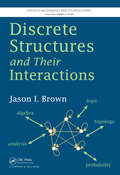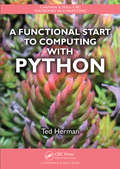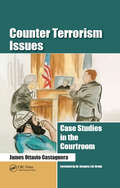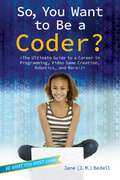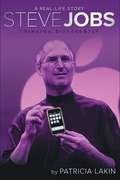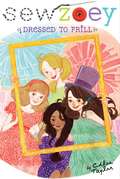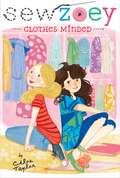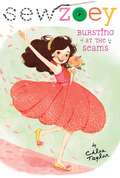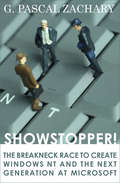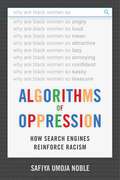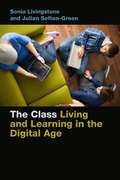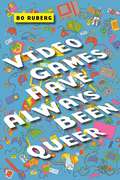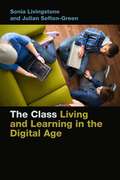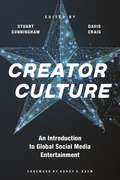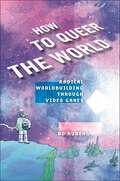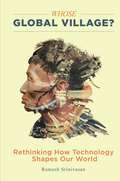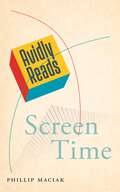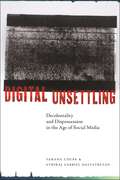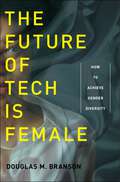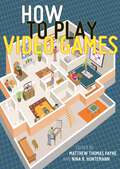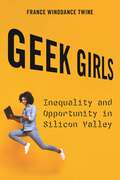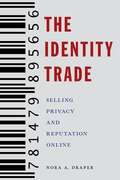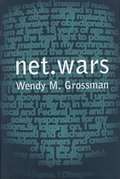- Table View
- List View
Discrete Structures and Their Interactions
by Jason I. BrownDiscover the Connections between Different Structures and FieldsDiscrete Structures and Their Interactions highlights the connections among various discrete structures, including graphs, directed graphs, hypergraphs, partial orders, finite topologies, and simplicial complexes. It also explores their relationships to classical areas of mathematics,
A Functional Start to Computing with Python (Chapman & Hall/CRC Textbooks in Computing)
by Ted HermanA Functional Start to Computing with Python enables students to quickly learn computing without having to use loops, variables, and object abstractions at the start. Requiring no prior programming experience, the book draws on Python's flexible data types and operations as well as its capacity for defining new functions. Along with the specifics of
Counter Terrorism Issues: Case Studies in the Courtroom
by James Ottavio CastagneraThe American legal profession and judicial system bear a unique responsibility to set and maintain the balance between defending homeland security and protecting the civil liberties outlined in the Bill of Rights. These competing interests will continue to collide as the threats to our safety grow. Exploring the most significant terrorist cases of
So, You Want to Be a Coder?: The Ultimate Guide to a Career in Programming, Video Game Creation, Robotics, and More!
by Jane J. BedellLove coding? Make your passion your profession with this comprehensive guide that reveals a whole host of careers working with code.Behind the screen of your phone, tablet, computer, or game console lies a secret language that allows it all to work. Computer code has become as integral to our daily lives as reading and writing, even if you didn't know it! Now it's time to plug in and start creating the same technology you're using every day. Covering everything from navigating the maze of computer languages to writing code for games to cyber security and artificial intelligence, So, You Want to Be a Coder? debugs the secrets behind a career in the diverse and state-of-the-art industry. In addition to tips and interviews from industry professionals, So, You Want to Be a Coder? includes inspiring stories from kids who are working with code right now, plus activities, a glossary, and helpful resources to put you on the path to a fun and rewarding career with computer code today!
Ada Lovelace
by Diane Stanley Jessie Hartland“A fascinating look at Ada Lovelace, the pioneering computer programmer and daughter of the poet Lord Byron."
Steve Jobs
by Patricia LakinWritten especially for a young audience, a must-read biography of Steve Jobs: visionary, entrepreneur, inventor, and cofounder of Apple.Visionary. Pioneer. Little terror. Entrepreneur. Inventor. College dropout. Creative genius. These are just a few of the words used to describe the late Steve Jobs, cofounder, chairman, and chief executive officer of Apple Inc. Available in both paperback and hardcover, Patricia Lakin's biography for middle-grade readers tells the captivating and inspirational story of the 'Thomas Edison' of our time.
Dressed to Frill
by Nancy Zhang Chloe TaylorZoey and her friends are dressed to the nines for Libby's bat mitzvah--but will things fall apart at the eleventh hour? Includes "Sew Zoey" blog posts and fashion illustrations.In the twelfth book in the Sew Zoey series, Zoey's friend Libby is preparing for her bat mitzvah, and Zoey, Priti, and Kate are really excited for the big party. Libby asks Zoey to make her dress, and loves the design--but her mom thinks it's inappropriate. Can Zoey find a way to compromise while still giving Libby her dream dress? Zoey is stuck in the middle in other ways, too: Her brother Marcus's relationship with Allie is on the rocks. Does Zoey's loyalty to her brother mean that she has to end her friendship with Allie? And when Zoey sees something shocking at the bat mitzvah party, she's not so sure she wants to be Allie's friend at all...
Clothes Minded
by Nancy Zhang Chloe TaylorZoey always tries to keep an open mind about clothes. Can she do the same for people, too? Includes "Sew Zoey" blog posts and fashion illustrations.In the eleventh book in the Sew Zoey series, Zoey Webber thinks she's helping when she gives advice to a boy who has a crush on her best friend Kate. Zoey tells him to wear a soccer jersey from Kate's favorite team, assuming that Kate will like him better if he's into sports. Kate finds out and feels betrayed that Zoey thinks she is so closed-minded. Meanwhile, Zoey helps her new friend Sean start a fashion club at school, promising to allow anyone to join. But when someone unexpected shows up to the first club meeting, Zoey struggles to stay true to her ideals and keep her focus on the clothes. Could Zoey be the one who is closed-minded, after all?
Bursting at the Seams
by Nancy Zhang Chloe TaylorZoey's aunt is throwing a surprise wedding, and wants Zoey to make her dress! Can Zoey keep it a secret until the big day? Includes "Sew Zoey" blog posts and fashion illustrations.In the tenth book in the Sew Zoey series, Zoey's aunt lets Zoey in on a very big secret: She and her fiancé are throwing a surprise wedding! She asks Zoey to make the wedding dress and be a junior bridesmaid. Zoey is so excited about the wedding she could burst--but can't say a word to anyone except her dad and Marcus. At school, Zoey has some new sewing competition: A boy in her new Home Economics unit is sewing circles around her, and is a strong competitor for a class sewing contest. For the sake of the wedding, can Zoey let go of her desire to win the competition?
Showstopper!: The Breakneck Race to Create Windows NT and the Next Generation at Microsoft
by G. Pascal ZacharyThis &“inside account captures the energy—and the madness—of the software giant&’s race to develop a critical new program. . . . Gripping&” (Fortune Magazine).Showstopper is the dramatic, inside story of the creation of Windows NT, told by Wall Street Journal reporter G. Pascal Zachary. Driven by the legendary David Cutler, a picked band of software engineers sacrifices almost everything in their lives to build a new, stable, operating system aimed at giving Microsoft a platform for growth through the next decade of development in the computing business. Comparable in many ways to the Pulitzer Prize–winning book The Soul of a New Machine by Tracy Kidder, Showstopper gets deep inside the process of software development, the lives and motivations of coders and the pressure to succeed coupled with the drive for originality and perfection that can pull a diverse team together to create a program consisting of many hundreds of thousands of lines of code.
MCSE Installing, Configuring and Administering Windows Server and Infrastructure 2012 Exam 70-410, 411, 412 and 413 (ExamFOCUS Study Notes and Review Questions)
by ExamreviewAccording to MS, a server administrator is responsible for the operations and management of an infrastructure of Windows Server 2012 servers in an enterprise environment. Exam 410 covers: - Installing and Configuring Windows Server 2012 - Introduction to Active Directory Domain Services - Managing Active Directory Domain Services Objects - Automating Active Directory Domain Services Administration - Implementing Networking Services - Implementing Local Storage - Implementing File and Print Services - Implementing Group Policy - Implementing Server Virtualization with Hyper-V On the other hand, Exam 411 covers: - Implementing a Group Policy Infrastructure - Managing User and Service Accounts - Maintaining Active Directory Domain Services - Configure and Troubleshoot DNS - Configure and Troubleshoot Remote Access - Installing, Configuring, and Troubleshooting the Network Policy Server role - Optimizing File Services - Increasing File System Security - Implementing Update Management Exam 413 has further coverage on:- Plan and Deploy a Server Infrastructure- Design and Implement Network Infrastructure Services- Design and Implement Network Access Services- Design and Implement an Active Directory Infrastructure (Logical)- Design and Implement an Active Directory Infrastructure (Physical) These exams actually share many common topics and it would be wise to study all of them together. We give you knowledge information relevant to the exam specifications. To be able to succeed in the real exams, you'll need to apply your earned knowledge to the question scenarios. Many of the exam questions are written to be less straight forward. They tend to be framed within the context of short scenarios. The exams are not too difficult. However, coverage is very comprehensive - a wide range of topics are presented in the official topic list. The exams do not ask you to answer hundreds of questions. In other words, only a small fraction of the official topics will be presented. To succeed in the exams, you need to read as many reference books as possible. There is no single book that can cover everything! This ExamFOCUS book focuses on the more difficult topics that will likely make a difference in exam results. The book is NOT intended to guide you through every single official topic. You should therefore use this book together with other reference books for the best possible preparation outcome. You should also download the evaluation copy of Server 2012 and play with it. ISO image file and burn a DVD disc out of it, then perform installation accordingly. Although there is a VHD version available, we do not recommend that you use it for testing. There are some complicated steps involved which may not always go as smooth. If you use the current version of Virtual Box (which is 4. 1. 22 as of the time of this writing) to run Server 2012, be sure to choose "Windows 8 (64bit)" as the choice of OS.
Algorithms of Oppression: How Search Engines Reinforce Racism
by Safiya Umoja NobleA revealing look at how negative biases against women of color are embedded in search engine results and algorithms Run a Google search for “black girls”—what will you find? “Big Booty” and other sexually explicit terms are likely to come up as top search terms. But, if you type in “white girls,” the results are radically different. The suggested porn sites and un-moderated discussions about “why black women are so sassy” or “why black women are so angry” presents a disturbing portrait of black womanhood in modern society.In Algorithms of Oppression, Safiya Umoja Noble challenges the idea that search engines like Google offer an equal playing field for all forms of ideas, identities, and activities. Data discrimination is a real social problem; Noble argues that the combination of private interests in promoting certain sites, along with the monopoly status of a relatively small number of Internet search engines, leads to a biased set of search algorithms that privilege whiteness and discriminate against people of color, specifically women of color.Through an analysis of textual and media searches as well as extensive research on paid online advertising, Noble exposes a culture of racism and sexism in the way discoverability is created online. As search engines and their related companies grow in importance—operating as a source for email, a major vehicle for primary and secondary school learning, and beyond—understanding and reversing these disquieting trends and discriminatory practices is of utmost importance.An original, surprising and, at times, disturbing account of bias on the internet, Algorithms of Oppression contributes to our understanding of how racism is created, maintained, and disseminated in the 21st century.
The Class: Living and Learning in the Digital Age (Connected Youth and Digital Futures #1)
by Julian Sefton-Green Sonia LivingstoneAn intimate look at how children network, identify, learn and grow in a connected world.Read Online at connectedyouth.nyupress.orgDo today’s youth have more opportunities than their parents? As they build their own social and digital networks, does that offer new routes to learning and friendship? How do they navigate the meaning of education in a digitally connected but fiercely competitive, highly individualized world?Based upon fieldwork at an ordinary London school, The Class examines young people's experiences of growing up and learning in a digital world. In this original and engaging study, Livingstone and Sefton-Green explore youth values, teenagers’ perspectives on their futures, and their tactics for facing the opportunities and challenges that lie ahead. The authors follow the students as they move across their different social worlds—in school, at home, and with their friends, engaging in a range of activities from video games to drama clubs and music lessons. By portraying the texture of the students’ everyday lives, The Class seeks to understand how the structures of social class and cultural capital shape the development of personal interests, relationships and autonomy. Providing insights into how young people’s social, digital, and learning networks enable or disempower them, Livingstone and Sefton-Green reveal that the experience of disconnections and blocked pathways is often more common than that of connections and new opportunities.
Video Games Have Always Been Queer (Postmillennial Pop #16)
by Bo RubergArgues for the queer potential of video gamesWhile popular discussions about queerness in video games often focus on big-name, mainstream games that feature LGBTQ characters, like Mass Effect or Dragon Age, Bonnie Ruberg pushes the concept of queerness in games beyond a matter of representation, exploring how video games can be played, interpreted, and designed queerly, whether or not they include overtly LGBTQ content. Video Games Have Always Been Queer argues that the medium of video games itself can—and should—be read queerly.In the first book dedicated to bridging game studies and queer theory, Ruberg resists the common, reductive narrative that games are only now becoming more diverse. Revealing what reading D. A. Miller can bring to the popular 2007 video game Portal, or what Eve Sedgwick offers Pong, Ruberg models the ways game worlds offer players the opportunity to explore queer experience, affect, and desire. As players attempt to 'pass' in Octodad or explore the pleasure of failure in Burnout: Revenge, Ruberg asserts that, even within a dominant gaming culture that has proved to be openly hostile to those perceived as different, queer people have always belonged in video games—because video games have, in fact, always been queer.
The Class: Living and Learning in the Digital Age (Connected Youth and Digital Futures #1)
by Sonia Livingstone Julian Sefton-GreenAn intimate look at how children network, identify, learn and grow in a connected world.Read Online at connectedyouth.nyupress.orgDo today’s youth have more opportunities than their parents? As they build their own social and digital networks, does that offer new routes to learning and friendship? How do they navigate the meaning of education in a digitally connected but fiercely competitive, highly individualized world?Based upon fieldwork at an ordinary London school, The Class examines young people's experiences of growing up and learning in a digital world. In this original and engaging study, Livingstone and Sefton-Green explore youth values, teenagers’ perspectives on their futures, and their tactics for facing the opportunities and challenges that lie ahead. The authors follow the students as they move across their different social worlds—in school, at home, and with their friends, engaging in a range of activities from video games to drama clubs and music lessons. By portraying the texture of the students’ everyday lives, The Class seeks to understand how the structures of social class and cultural capital shape the development of personal interests, relationships and autonomy. Providing insights into how young people’s social, digital, and learning networks enable or disempower them, Livingstone and Sefton-Green reveal that the experience of disconnections and blocked pathways is often more common than that of connections and new opportunities.
Creator Culture: An Introduction to Global Social Media Entertainment
by David Craig Stuart CunninghamExplores new perspectives on social media entertainmentThere is a new class of cultural producers—YouTube vloggers, Twitch gameplayers, Instagram influencers, TikTokers, Chinese wanghong, and others—who are part of a rapidly emerging and highly disruptive industry of monetized “user-generated” content. As this new wave of native social media entrepreneurs emerge, so do new formations of culture and the ways they are studied.In this volume, contributors draw on scholarship in media and communication studies, science and technology studies, and social media, Internet, and platform studies, in order to define this new field of study and the emergence of creator culture. Creator Culture introduces readers to new paradigms of social media entertainment from critical perspectives, demonstrating both relations to and differentiations from the well-established media forms and institutions traditionally within the scope of media studies.This volume does not seek to impose a uniform perspective; rather, the goal is to stimulate in-depth, globally-focused engagement with this burgeoning industry and establish a dynamic research agenda for scholars, teachers, and students, as well as creators and professionals across the media, communication, creative, and social media industries.Contributors include: Jean Burgess, Zoë Glatt, Sarah Banet-Weiser, Brent Luvaas, Carlos A. Scolari, Damián Fraticelli, José M. Tomasena, Junyi Lv, Hector Postigo, Brooke Erin Duffy, Megan Sawey, Jarrod Walzcer, Sangeet Kumar, Sriram Mohan, Aswin Punathambekar, Mohamed El Marzouki, Elaine Jing Zhao, Arturo Arriagada, Jeremy Shtern, Stephanie Hill
How to Queer the World: Radical Worldbuilding through Video Games
by Bo RubergWhat video games teach us about building a more inclusive worldWhat does it mean to build a world? Worldbuilding is traditionally understood as an expression of storytelling across media forms. Yet, as video games show us, worldbuilding does not necessarily need to center narrative elements. Instead, new worlds can allow us to reimagine existing structures, conventions, and constants. Doing so gives us the tools to queer the world around us.How to Queer the World argues that video games provide us with keen insight into worldbuilding. With these insights come a new understanding of the ever-elusive ideals of queer worldmaking. Video games challenge us to address how worlds are built through underlying systems rather than surface-level representation. They also offer opportunities to envision alternate and queer ways of living, loving, desiring, and being. Each of the chapters in this book presents a close reading of a video game that illustrates one way of building worlds and encoding them with meaning, focusing on elements of digital media often overlooked as technical rather than cultural.From the design of game mechanics and user interfaces to the use of graphics software and physics simulations, Bo Ruberg argues that these aspects of video games represent a critical toolkit for seeing the work of worldbuilding differently—in video games and beyond. Simultaneously, each of these video games models an approach to what Ruberg terms “queer worldbuilding.” Queer worldbuilding radically remakes the world by destabilizing the fundamental logics of our own universe: who we are, what we can do, how our bodies move, and how we exist within time and space.
Whose Global Village?: Rethinking How Technology Shapes Our World
by Ramesh SrinivasanThis critical reassessment of digital proliferation calls for a new approach to technology that includes marginalized, non-western communities. In the digital age, technology has shrunk the physical world into a &“global village,&” where we all seem to be connected as an online community. Yet while we think of platforms such as Twitter and Facebook as open and accessible to all, they are in fact commercial entities developed primarily by and for the Western world. Considering how new technologies increasingly shape labor, economics, and politics, these tools often reinforce the inequalities of globalization, rarely reflecting the perspectives of those at the bottom of the digital divide. This book asks us to re-consider &‘whose global village&’ we are shaping with the digital technology revolution. Sharing stories of collaboration with Native Americans in California and New Mexico, revolutionaries in Egypt, communities in rural India, and others across the world, Ramesh Srinivasan urges us to re-imagine what the Internet, mobile phones, or social media platforms may look like when considered from the perspective of diverse cultures. Collaboration with maginalized communities could pave the way for a people-first approach toward designing and working with new technology worldwide.
Avidly Reads Screen Time
by Phillip MaciakWhat happens when screen time is all the time?In the early 1990s, the phrase “screen time” emerged to scare parents about the dangers of too much TV for kids. Screen time was something to fret over, police, and judge in a low-grade moral panic. Now, “screen time” has become a metric not only for good parenting, but for our adult lives as well. There’s even an app for it! In the streaming era—and with streaming made nearly ubiquitous during COVID-19—almost every aspect of our day is mediated by these bright surfaces. Whether it was ever the real villain in the first place, or merely a convenient proxy for unaddressed familial, social, and institutional failures, screen time is now all the time.Avidly Reads Screen Time is a funny, insightful work of cultural criticism and history about how we define screens, and how they now define us. From Mad Men to iCarly, Vine to FaceTime, binge-watching to doom-scrolling, Phillip Maciak leads us on a sometimes heartwarming, sometimes harrowing tour of the media that brings us together and tears us apart.
Digital Unsettling: Decoloniality and Dispossession in the Age of Social Media (Critical Cultural Communication)
by Sahana Udupa Ethiraj Gabriel DattatreyanHow digital networks are positioned within the enduring structures of colonialityThe revolutionary aspirations that fueled decolonization circulated on paper—as pamphlets, leaflets, handbills, and brochures. Now—as evidenced by movements from the Arab Spring to Black Lives Matter—revolutions, protests, and political dissidence are profoundly shaped by information circulating through digital networks. Digital Unsettling is a critical exploration of digitalization that puts contemporary “decolonizing” movements into conversation with theorizations of digital communication. Sahana Udupa and Ethiraj Gabriel Dattatreyan interrogate the forms, forces, and processes that have reinforced neocolonial relations within contemporary digital environments, at a time when digital networks—and the agendas and actions they proffer—have unsettled entrenched hierarchies in unforeseen ways. Digital Unsettling examines events—the toppling of statues in the UK, the proliferation of #BLM activism globally, the rise of Hindu nationalists in North America, the trolling of academics, among others—and how they circulated online and across national boundaries. In doing so, Udupa and Dattatreyan demonstrate how the internet has become the key site for an invigorated anticolonial internationalism, but has simultaneously augmented conditions of racial hierarchy within nations, in the international order, and in the liminal spaces that shape human migration and the lives of those that are on the move. Digital Unsettling establishes a critical framework for placing digitalization within the longue durée of coloniality, while also revealing the complex ways in which the internet is entwined with persistent global calls for decolonization.
The Future of Tech Is Female: How to Achieve Gender Diversity
by Douglas M Branson&“Technology has the worst record of promoting and retaining female executive…[This] book wanders through this paradox . . . to provide solutions." —Harvard Law Review Tech giants like Apple and Google are among the fastest growing companies in the world, leading innovations in design and development. The industry continues to see rapid growth, employing millions of people: in the US it is at the epicenter of the American economy. So why is it that only five percent of senior executives in the tech industry are female? Underrepresentation of women on boards of directors, in the C-suite, and as senior managers remains pervasive in this industry. As tech companies are plagued with high-profile claims of harassment and discrimination, and salary discrepancies for comparable work, what prevents women from reaching management roles, and, more importantly, what can be done to fix it?The Future of Tech is Female considers the paradoxes involved in women&’s ascent to leadership roles, suggesting industry-wide solutions to combat gender inequality. Drawing upon fifteen years of experience in the field, Douglas M. Branson traces the history of women in the information technology industry in order to identify solutions for the issues facing women today. Branson unpacks the plethora of reasons women should hold leadership roles, both in and out of this industry. An invaluable resource for anyone invested in gender equality in corporate governance, The Future of Tech is Female lays out the steps toward a more diverse future for women in tech leadership &“[Branson] combines meticulous research and thorough documentation in a very readable, thought-provoking narrative.&” —Choice &“A crucial book on a crucial subject.&” —Deborah Rhode,E.W. McFarland Professor of Law, Stanford University
How to Play Video Games (User's Guides to Popular Culture #1)
by Nina B. Huntemann Matthew Thomas PayneForty original contributions on games and gaming culture What does Pokémon Go tell us about globalization? What does Tetris teach us about rules? Is feminism boosted or bashed by Kim Kardashian: Hollywood? How does BioShock Infinite help us navigate world-building?From arcades to Atari, and phone apps to virtual reality headsets, video games have been at the epicenter of our ever-evolving technological reality. Unlike other media technologies, video games demand engagement like no other, which begs the question—what is the role that video games play in our lives, from our homes, to our phones, and on global culture writ large? How to Play Video Games brings together forty original essays from today’s leading scholars on video game culture, writing about the games they know best and what they mean in broader social and cultural contexts. Read about avatars in Grand Theft Auto V, or music in The Legend of Zelda: Ocarina of Time. See how Age of Empires taught a generation about postcolonialism, and how Borderlands exposes the seedy underbelly of capitalism. These essays suggest that understanding video games in a critical context provides a new way to engage in contemporary culture. They are a must read for fans and students of the medium.
Geek Girls: Inequality and Opportunity in Silicon Valley
by France Winddance TwineChoice Outstanding Academic Title for 2023An inside account of gender and racial discrimination in the high-tech industryWhy is being a computer “geek” still perceived to be a masculine occupation? Why do men continue to greatly outnumber women in the high-technology industry? Since 2014, a growing number of employment discrimination lawsuits has called attention to a persistent pattern of gender discrimination in the tech world. Much has been written about the industry’s failure to adequately address gender and racial inequalities, yet rarely have we gotten an intimate look inside these companies. In Geek Girls, France Winddance Twine provides the first book by a sociologist that “lifts the Silicon veil” to provide firsthand accounts of inequality and opportunity in the tech ecosystem. This work draws on close to a hundred interviews with male and female technology workers of diverse racial, ethnic, and educational backgrounds who are currently employed at tech firms such as Apple, Facebook, Google, and Twitter, and at various start-ups in the San Francisco Bay area. Geek Girls captures what it is like to work as a technically skilled woman in Silicon Valley. With a sharp eye for detail and compelling testimonials from industry insiders, Twine shows how the technology industry remains rigged against women, and especially Black, Latinx, and Native American women from working class backgrounds. From recruitment and hiring practices that give priority to those with family, friends, and classmates employed in the industry, to social and educational segregation, to academic prestige hierarchies, Twine reveals how women are blocked from entering this industry. Women who do not belong to the dominant ethnic groups in the industry are denied employment opportunities, and even actively pushed out, despite their technical skills and qualifications. While the technology firms strongly embrace the rhetoric of diversity and oppose discrimination in the workplace, Twine argues that closed social networks and routine hiring practices described by employees reinforce the status quo and reproduce inequality. The myth of meritocracy and gender stereotypes operate in tandem to produce a culture where the use of race-, color-, and power-evasive language makes it difficult for individuals to name the micro-aggressions and forms of discrimination that they experience. Twine offers concrete insights into how the technology industry can address ongoing racial and gender disparities, create more transparency and empower women from underrepresented groups, who continued to be denied opportunities.
The Identity Trade: Selling Privacy and Reputation Online (Critical Cultural Communication #7)
by Nora A. DraperThe successes and failures of an industry that claims to protect and promote our online identitiesWhat does privacy mean in the digital era? As technology increasingly blurs the boundary between public and private, questions about who controls our data become harder and harder to answer. Our every web view, click, and online purchase can be sold to anyone to store and use as they wish. At the same time, our online reputation has become an important part of our identity—a form of cultural currency.The Identity Trade examines the relationship between online visibility and privacy, and the politics of identity and self-presentation in the digital age. In doing so, Nora Draper looks at the revealing two-decade history of efforts by the consumer privacy industry to give individuals control over their digital image through the sale of privacy protection and reputation management as a service.Through in-depth interviews with industry experts, as well as analysis of media coverage, promotional materials, and government policies, Draper examines how companies have turned the protection and promotion of digital information into a business. Along the way, she also provides insight into how these companies have responded to and shaped the ways we think about image and reputation in the digital age.Tracking the successes and failures of companies claiming to control our digital ephemera, Draper takes us inside an industry that has commodified strategies of information control. This book is a discerning overview of the debate around who controls our data, who buys and sells it, and the consequences of treating privacy as a consumer good.
net.wars
by Wendy GrossmanFull text online version at www.nyupress.org/netwars. Who will rule cyberspace? And why should people care? Recently stories have appeared in a variety of news media, from the sensational to the staid, that portray the Internet as full of pornography, pedophilia, recipes for making bombs, lewd and lawless behavior, and copyright violators. And, for politicians eager for votes, or to people who have never strolled the electronic byways, regulating the Net seems as logical and sensible as making your kids wear seat belts. Forget freedom of speech: children can read this stuff. From the point of view of those on the Net, mass-media's representation of pornography on the Internet grossly overestimates the amount that is actually available, and these stories are based on studies that are at best flawed and at worst fraudulent. To netizens, the panic over the electronic availability of bomb-making recipes and other potentially dangerous material is groundless: the same material is readily available in public libraries. Out on the Net, it seems outrageous that people who have never really experienced it are in a position to regulate it. How then, should the lines be drawn in the grey area between cyberspace and the physical world? In net.wars, Wendy Grossman, a journalist who has covered the Net since 1992 for major publications such as Wired, The Guardian, and The Telegraph, assesses the battles that will define the future of this new venue. From the Church of Scientology's raids on Net users to netizens attempts to overthrow both the Communications Decency Act and the restrictions on the export of strong encryption, net.wars explains the issues and the background behind the headlines. Among the issues covered are net scams, class divisions on the net, privacy issues, the Communications Decency Act, women online, pornography, hackers and the computer underground, net criminals and sociopaths, and more.
